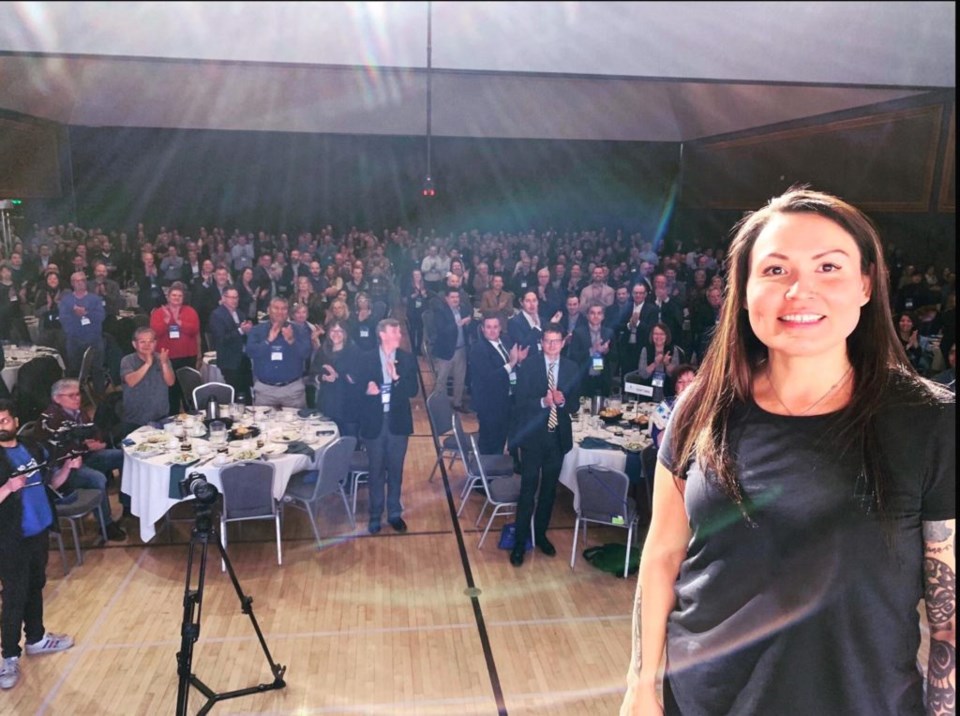The day before Crystal Smith’s speech at the Natural Resource Forum, she sat down to review her prepared remarks…and threw them out.
Chief Councillor of the Haisla Nation, Smith was scheduled to deliver the Forum’s keynote. Her speech was prepared, ready to go. After watching Premier John Horgan’s address, she realized she had to tell her own story – and nobody else’s.
“I decided I’m just going to wing this,” she told me a few days later.
Was it intimidating, walking out on stage without a net – or speaking notes?
“You have no idea.”
While she has become an indisputably public figure – both as Chief Councillor of the Haisla Nation and Chair of the First Nations LNG Alliance – Smith doesn’t relish public speaking.
At all.
“When I first took this job, one of the stipulations that I had…was that I wouldn't have to speak in public and that I wouldn't do interviews, radio or any type of interviews.
“That gives you a little bit of a context of where I started, to walking up on that stage and not having any notes….[it] was absolutely terrifying,” says Smith.

Instead, of speaking about economic opportunity as a general concept, Smith felt it would be more powerful – and personal – to share her own lived experience.
(Selected excerpts from Smith's speech follow in italics.)
“I figured, you’ve heard the messages as the chief councillor. You’ve seen why our Nation does what we do. You’ve heard about the poverty, the message of moving from managing poverty to managing prosperity. You’ve heard that hope-and-determination talk.”
Specifically, Smith wanted to get past generalities, and speak about life in Haisla lands, both when she was growing up, and now for her children and grandchildren.
As Smith tells it, the difference is night and day.
“I was reflecting back on what it was like, growing up at home.
I get often asked in reports and newspapers what that was like, and I tell you that, as an 11-year-old, 12-year-old girl, walking on our front street from my grandparents’ house, to my basketball practice, I would pass our old band office every day, and think, ‘I’m going to be either a janitor, or an assistant to somebody, and that’s the only place that I can work.’”
To say her speech was received well is probably something of an understatement.
To be clear: I wasn’t there. But the reaction on social media was positively glowing – and as someone with more than a passing interest in how speeches are received, the near-universal praise in real time stood out dramatically.
The Forum was deluged with requests for transcripts and video. A few days later, the Haisla posted a transcript, and just this week, video of Smith’s speech made the rounds.
Some of the details of Smith’s story are difficult to read – or watch, or listen to.
“I’ve experienced suicide. Firsthand. So if you think about everything we talk about, that everything that I’ve talked about in the media when it comes to poverty, I’ve been there. Suicide, been there. Not to get anything in educational background, been there.
I don’t want our people to continue living THAT life.”
Smith wanted her speech to be a counterpoint to what she calls the “sensationalism” that dominates the news and dialogue between Indigenous communities and the rest of Canada – which has increased in intensity, even in the week since the Forum.
“What sells newspapers? It’s the kids chained to the door [at the legislature], right? People don’t sit in front of the TV and catch two minutes of Global News when there’s something good happening,” says Smith.
“It's not too often that people want to do and pay attention to people that are making differences. Positive differences.”
Despite the uphill struggle to hold attention, Smith believes things are moving in the right direction.
It starts with “the recognition that First Nations communities aren't your average stakeholders. We are not stakeholders in our own territories. We are effectually landowners. We're landlords in our territories.”
“The fact that the conversation [is] moving into that context of that recognition, and development going hand in hand, is what provides the success to projects.”
Smith doesn’t want to comment or make recommendations for other First Nations or Indigenous communities, but as far as the Haisla having some measure of success in taking control of their own destiny:
“We're not the first. I definitely hope that we're not the last.”
Maclean Kay is Editor-in-Chief of The Orca
SWIM ON:
- In December 2018, Crystal Smith penned an open letter on why the Haisla Nation supports LNG.
- Dallas Smith on UNDRIP, the meaning of consent, and the Wet'suwet'en dispute.
- Former Haisla Nation Chief Councillor and current MLA Ellis Ross: who speaks for Aboriginal people?


